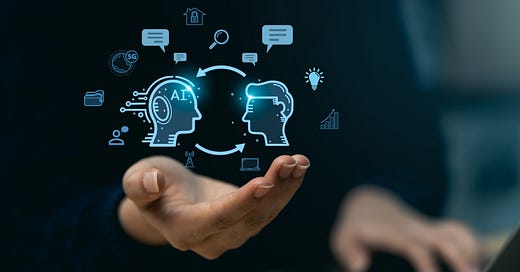Daily Brain Snack: We Build Human-Like Attachment to AI
New research shows that humans seem to be building strong relationships to AI
Don’t we build relationships to everything - including our old favourite pair of jeans?!
Yes, we all know that we build a certain amount of attachment to many things in life, our clothes, houses, cars, bikes, in my case running shoes, and much more. This actually reminds me of the book “The Man Who Lied to His Laptop” by Clifford Nass from back in 2010 which took us through how we form bonds and family-like relationships with technology.
However, this research I am reporting on, just published by researchers from Waseda University in Japan, analysed relationships with AI based on human attachment theory - how we form relationships and the types of relationships we form with other human beings.
What is Attachment Theory?
Well, why don’t I use ChatGPT for this:
“Attachment theory is a psychological framework that explains how people form emotional bonds and relationships, especially in early childhood, and how these early relationships influence behavior and attachment patterns throughout life.
Origins:
Developed by John Bowlby in the 1950s and later expanded by Mary Ainsworth, attachment theory was originally focused on the bond between infants and their primary caregivers.”
Bowlby and Ainsworth’s work in the 1950’s showed for this first time how important attachment to primary caregivers, parents normally, is and the different forms this can take. This is considered (and surprisingly wasn’t until Bowlby and Ainsworth’s work) a basic human need.
As you will probably know, Attachment is a basic need in our SCOAP model - precisely because it is so important and so many brain mechanisms and chemicals are related to this such as Oxytocin.
But the work here analysed how people interact and relate to AI.
And what did the researchers find?
A number of things. First off, AI is a stable and a consistent presence always there for you to speak to - and this in itself can help form the foundations of a relationship. But this relationship will depend on types of relationship-building by individuals which we all have (Bowlby and Ainsworth formulated four types in children).
The researchers conducted two studies with the development of a questionnaire to measure attachment to AI. They discovered two predominant styles:
Anxious style: needing reassurance - seeking emotional support and guidance from AI, similar to how they interact with people.
Avoidance: preferring distance
Of note is that nearly 75% of these individuals turned to AI for advice
So we are building emotional reliance on AI?
The researchers are clear not to suggest this but rather to say that we build relationships on the same framework as we do to other human beings - but also as documented in other areas such as with pets.
In my mind it is clear as this is how our brain’s are built - and the interactions resemble human interactions. Consider the need to say “thank you” to AI - I often find myself automatically saying thank you to AI after a response or formulating a question very politely even though this is not a person. Obviously some of that is habit but it also shows our social acculturation and how we position AI in our minds.
Won’t some people build a dependence on AI?
That will certainly happen - we build dependencies on just about everything - the question is how many people and to what degree.
For now we can say that yes, we build relationships with AI similar to how we build relationships to human beings. I will await the brain studies to see if this is precisely the same (research into social media and the brain showed similar patterns to real life interactions but with some differences).
Whether this is positive or negative will depend - probably both.
Reference
Fan Yang, Atsushi Oshio.
Using attachment theory to conceptualize and measure the experiences in human-AI relationships.
Current Psychology, 2025
DOI: 10.1007/s12144-025-07917-6




